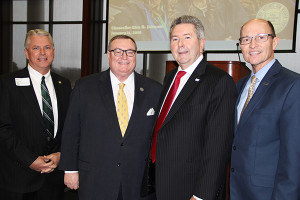
RSU President Larry Rice stands with Chancellor Glen D. Johnson, Northeastern State University President Steve Turner, and Northeastern Oklahoma A&M College President Jeff Hale during the OSRHE Legistlative Tour on Jan. 21. From left to right: Turner, Johnson, Rice and Hale.
Strengthening Oklahoma’s workforce pipeline through degree and certificate completion continues to be the state system of higher education’s top priority. That was the message delivered by Chancellor Glen D. Johnson as he presented the Oklahoma State Regents for Higher Education’s FY 2016 legislative agenda to an audience of lawmakers, community leaders and educators at Rogers State University on Jan. 21.
“Our system of higher education remains committed to college degree and certificate attainment,” Johnson said. “We know that increasing college degrees and certificates is Oklahoma’s pathway to jobs and prosperity, increasing our state’s per capita income, and advancing economic growth. No entity in state government can help Oklahoma reach its goals of educational excellence and workforce development faster or more comprehensively than public higher education.”
Also speaking at the event were RSU President Dr. Larry Rice and Student Government Association President Chelsea Fiedler. Fiedler, a political science junior from Vinita, shared how her time at RSU has impacted her perception of higher education.
“The experience higher education has given me and many other students like me is worth being supported by the state,” Fiedler said. “Education, especially at the college level, is more than just school; it’s a supportive learning community of unique people, and I urge everyone to make their best effort to increase higher education opportunities throughout the state.”
OSRHE recently voted to request $963.4 million for FY 2017, which reflects no increase over the FY 2016 appropriation of $963.4 million. The State Regents also approved an addendum acknowledging the need for $22 million to meet campus operational fixed costs.
Johnson emphasized that the State Regents are working to ensure that the state’s budget shortfall does not adversely affect students’ education experience. Oklahoma has the third lowest average cost of higher education in the nation, with 45 percent of state graduates finishing school without student loan debt. Johnson also noted that state allocations for student aid are the highest they’ve been in three years, with 9.8 percent of higher education funds being used for scholarships and other state aid.
The State Regents will also continue efforts to preserve the Oklahoma’s Promise scholarship as an access program. Recognized by many as America’s best college access program, Oklahoma’s Promise is considered a model that combines emphases on academic preparation and financial support for college. More than 65,000 students have earned college tuition scholarships through Oklahoma’s Promise since the program’s inception in 1992.
Another area of focus in the coming legislative session will be maintaining the current law regarding weapons on higher education campuses. Under the current law, campus presidents have the discretion to grant exceptions to the campus weapons ban when an exception is warranted. The State Regents and the presidents of all 25 state system institutions agree the current law is the best way to maintain campus safety for students, faculty, staff and visitors. Johnson noted that the preference to keep the current law did not mean that the State Regents or presidents were opposed to the second amendment or to gun ownership.
